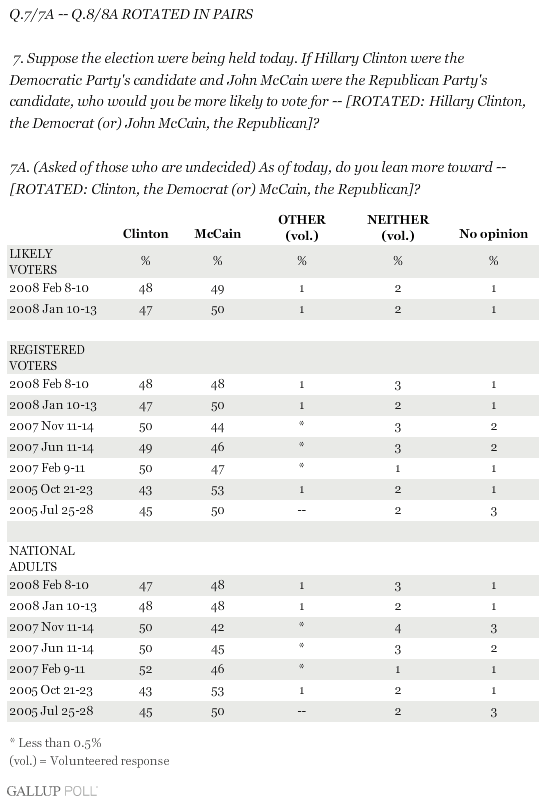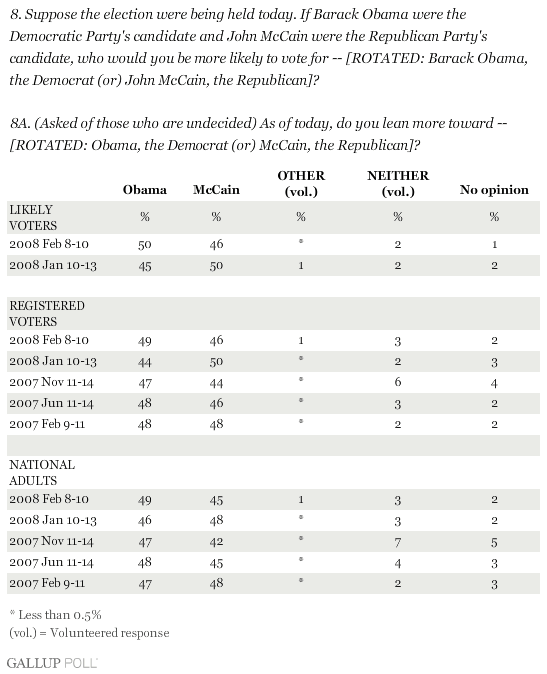PRINCETON, NJ -- John McCain essentially holds his own when pitted against either of the two leading Democratic candidates for president in hypothetical general-election trial heats. This is despite the fact that Democrats have a decided advantage on several non-election measures of party strength and positioning.
The new USA Today/Gallup poll, conducted Feb. 8-10, shows that McCain leads Hillary Clinton by one point, 49% to 48%, in a hypothetical general-election matchup among likely voters. He trails Barack Obama by four points, 46% to 50%. Both of these differences are within the poll's margin of error, and suggest that if the election were held today, it would be a close race if McCain were the Republican nominee and either Obama or Clinton were the Democratic nominee. The results also suggest that despite vigorous discussions of whether Clinton or Obama would be most electable in November, Obama has at best a slight advantage over Clinton on that dimension.
At the same time, a number of recent measures included in the Gallup Poll and other polls show that the Democrats in theory have some strong structural political advantages at this point. In terms of the parties' favorable images, Democrats have double-digit leads over Republicans in recent Gallup Polls. Within the current sample, 54% of those interviewed either identify with or lean toward the Democratic Party, compared to just 39% who identify with or lean toward the Republican Party. And on generic presidential election questions, in which respondents are asked which party's candidate they would like to win the presidency next fall (without naming names), the Democrats have typically been winning by double-digit margins.
In short, there appears to be a significant advantage for the Democrats over the Republicans on several general measures of party image and strength. McCain thus outperforms what would be predicted in the general-election trial heats, everything else being equal.
Bottom Line
Many things can and will change between now and Election Day next Nov. 4. For the moment, several indicators in recent polls point to a propitious political environment for the Democrats. Despite that, the front-running GOP nominee, McCain, tests quite well against the two leading Democratic candidates -- beating Clinton by one point and losing to Obama by four points, both of which are gaps within the margin of error. If these types of numbers were to hold through the fall, the coming election could be a close one, regardless of voters' apparently negative attitudes toward the Republican Party.


Survey Methods
Results are based on telephone interviews with 1,016 national adults, aged 18 and older, conducted Feb. 8-10, 2008. For results based on the total sample of national adults, one can say with 95% confidence that the maximum margin of sampling error is ±3 percentage points.
For results based on the sample of 926 registered voters, the maximum margin of sampling error is ±4 percentage points.
Results for likely voters are based on the subsample of 706 survey respondents deemed most likely to vote in the November 2008 general election, according to a series of questions measuring current voting intentions and past voting behavior. For results based on the total sample of likely voters, one can say with 95% confidence that the maximum margin of sampling error is ±4 percentage points. The "likely voter" model assumes a turnout of 60% of national adults. The likely voter sample is weighted to match this assumption, so the weighted sample size is 606.
In addition to sampling error, question wording and practical difficulties in conducting surveys can introduce error or bias into the findings of public opinion polls.
